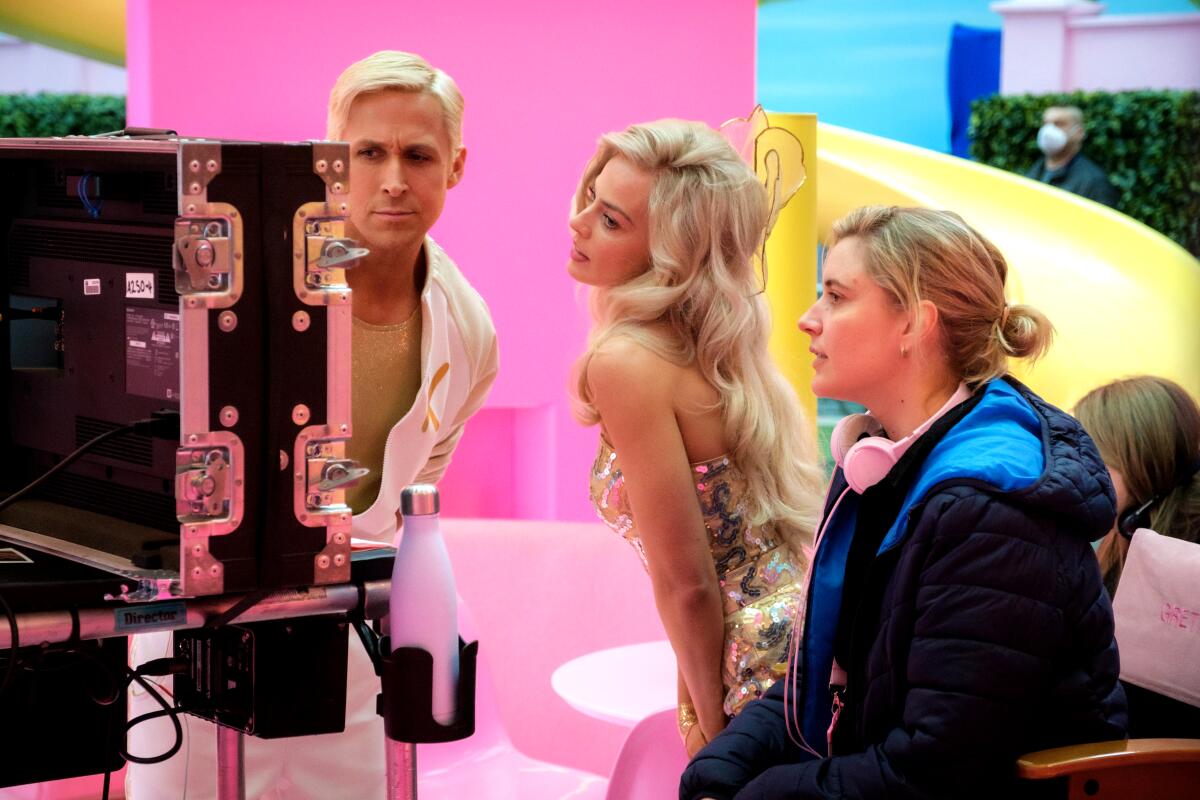
Greta Gerwig and Margot Robbie’s Oscar snubs prove the movie’s premise.
(Jaap Buitendijk / Warner Bros. Pictures)
If only Barbie had done a little time as a sex worker. Or barely survived becoming the next victim in a mass murder plot. Or stood accused of shoving Ken out of the Dream House’s top window.
Certainly millions of “Barbie” fans are currently wishing they could push someone — perhaps a member or two of the film academy — out of a very high window.
How on earth does the list of 2024 Oscar nominations not include Greta Gerwig and Margot Robbie, who, respectively, directed and starred in a film that defied all critical expectations and made moviegoing fun again?
More pointedly, how did voters justify giving “Barbie,” with its very clear message that women have to dance backward in heels to get half the validation their male peers get, a best picture nom while ignoring the two women who made that picture possible?
That Ryan Gosling and America Ferrera got nominations for their supporting roles was cause for rejoicing. But apparently no one in the academy was actually listening when Ferrera’s Gloria delivered her now-famous monologue about why it feels impossible to be a woman. Gerwig was nominated, alongside her husband, Noah Baumbach, for adapted screenplay, but the irony of her being snubbed (again) for directing the film that featured that scene is breathtaking.
First Hollywood tells us, repeatedly, that female directors can’t win the box office and then when one does, while also winning raves from critics, well, apparently it had nothing to do with the quality of the directing.
Did too many people (particularly women) enjoy “Barbie” for it to be considered “important” enough for academy voters? Did Robbie’s Barbie not suffer enough? Did Gerwig simply make it look too effortless?
Was it just too pink?
It was a great year for film and all of the nominees did tremendous work, but no director or actor faced the same degree of difficulty as Robbie and Gerwig.
Not to detract from anyone’s achievement, but stories that center on death and/or mass murder, which fill most of the director category, have a certain level of tension and drama built in, and the film academy has a modern history of valuing, at least when it comes time for awards, movies that are tense and dramatic over anything bright and shiny.
Even when the bright and shiny is also deeply moving and brilliant. As Barbie herself discovered, some people have a difficult time believing that something fun and beautiful can also be quite smart and important.
Though the increased diversity of the voters has forced a welcome movement away from biopics of famous men, there remains a certain snobbery over tone — a certain level of “real-life” grittiness is all but required to be considered “best,” even for sentimental favorites like “CODA” or groundbreaking winners like “Moonlight” and “Parasite.”
It’s all but impossible to imagine the original “Mary Poppins” making its Oscar sweep today.
Which is absurd; excellence comes in all forms and color palettes, and if the Oscars are honoring actual achievement in filmmaking, who thought a big Hollywood film about a doll, and one that most modern children reject after the age of 6, would make audiences of all ages laugh, cry and cheer, sometimes all at once?
Who thought “Barbie” would become one of the most successful female empowerment films in history?
Maybe it was the PG-13 rating that turned voters off. It’s difficult not to contrast the limited nominations for “Barbie” with the overwhelming amount of academy love shown for “Poor Things,” another fantastical story of a “manufactured” woman finding her way in the world, though hewing more to traditional Oscar-approved lines.
The “what was I made for” themes are remarkably similar, but “Poor Things” is, in many ways, the male gaze on a plate — what exactly are we to make of the sight of a full-grown woman with the brain of a child discovering the joy of orgasm? Or her literal childlike appreciation for sex? Or her questionable, if more mature, decision that sex work is the obvious, and enjoyable, answer to her need for sex and money.
Perhaps a sex scene or two would have convinced academy voters that “Barbie” was just as affecting and creative a story of female empowerment that required the same high level of direction and acting.
Traditionally, films that do well at the box office often come up short at the Oscars. Just ask Christopher Nolan, now perched with “Oppenheimer” on a pile of nominations. It was the outcry of the omission of his “Dark Knight” from best picture that sparked the academy’s decision to expand the field from five to up to 10 nominees. So one can only hope Gerwig’s next project is a biopic of Madame Curie or Lizzie Borden.
And that Robbie seriously glams down for her next film, like Charlize Theron did for her Oscar-winning role as serial killer Aileen Wuornos in “Monster.”
In terms of the race, and the telecast (which, to be fair, are not what voters should consider) these snubs cast a definite pall over the proceedings. Few thought that Gerwig could win in a category that includes Nolan and Martin Scorsese, but it sure would have been nice to see her out there campaigning. Honestly, she probably should have leaned more heavily on the “making this film was so hard, everything felt so impossible” narrative instead of stressing, with unfailing generosity, how satisfying the experience was. The same goes for Robbie, who also produced the film through her production company, LuckyChap Entertainment.
Obviously, getting snubbed by the Oscars is not the worst thing that could happen to a person — as I write this, more than 100 of my colleagues at The Times are getting layoff notices. In another instance of breathtaking irony, LA Times Studios, which has been deeply affected by recent cuts, received its first Oscar nomination, for the short documentary “The Last Repair Shop.”
But the Oscars remain one of the most visible barometers of value and success in Hollywood and so who makes the list and who does not, and how people react to it, means something. Many people believed that Gerwig and Robbie were shoo-ins. As history has proved time and again, assuming a woman is going to be a shoo-in for anything (even the actress category) is never a good idea because to succeed, women have to defy all manner of expectations while also meeting every one.
News
DRAYMOND GREEN TRASHES PATRICK BEVERLEY’S ANTICS .kf
Draymond James is not holding back on his opinions about Patrick Beverly’s post-game actions. In a recent statement, James expressed concern over Beverly’s behavior following losses. The…
LEBRON JAMES ‘SHUDDERS’ AT DARVIN HAM’S PLANS FOR HIM: “IT’S LIKE TRYING TO FIT A SQUARE PEG INTO A ROUND HOLE” .kf
LeBron James ‘bristled’ at Darvin Ham’s scheme for him, and the Lakers swiftly ditched it. The plot twist had everyone scratching their heads. Imagine King James getting…
Wild New Rumor Claims LeBron James To The Philadelphia 76ers Is “Going To Happen” .kf
LeBron James (Photo by Ronald Martinez/Getty Images) For what seems like the third or fourth time in his illustrious career, we are trying to figure out where LeBron…
Everyone Is Falling In Love With NBA Reporter Ashley ShahAhmadi During The Playoffs .kf
Ashley ShahAhmadi (Photo via ashleynshahahmadi/Instagram) Ashley ShahAhmadi, the Charlotte Hornets reporter, is going extremely viral on social media. A recent stir among NBA fans was sparked when they discovered a new…
VIDEO: Some Dude Just Revealed the Cold Cold Truth About Why All These NBA Draft Prospects Are “Dating White Women” .kf
Caleb Williams at NFL Draft (Photo by Aaron J. Thornton/Getty Images) Unless this is your first day in America, then you know race relations in this country…
Denver Nuggets star Michael Porter Jr. gifted dad a Tesla for Christmas and surprised mom with SUV in his rookie year .kf
DENVER Nuggets star Michael Porter Jr. hasn’t been afraid to give back to his parents who helped him reach the NBA. Porter Jr. gifted cars to his…
End of content
No more pages to load






